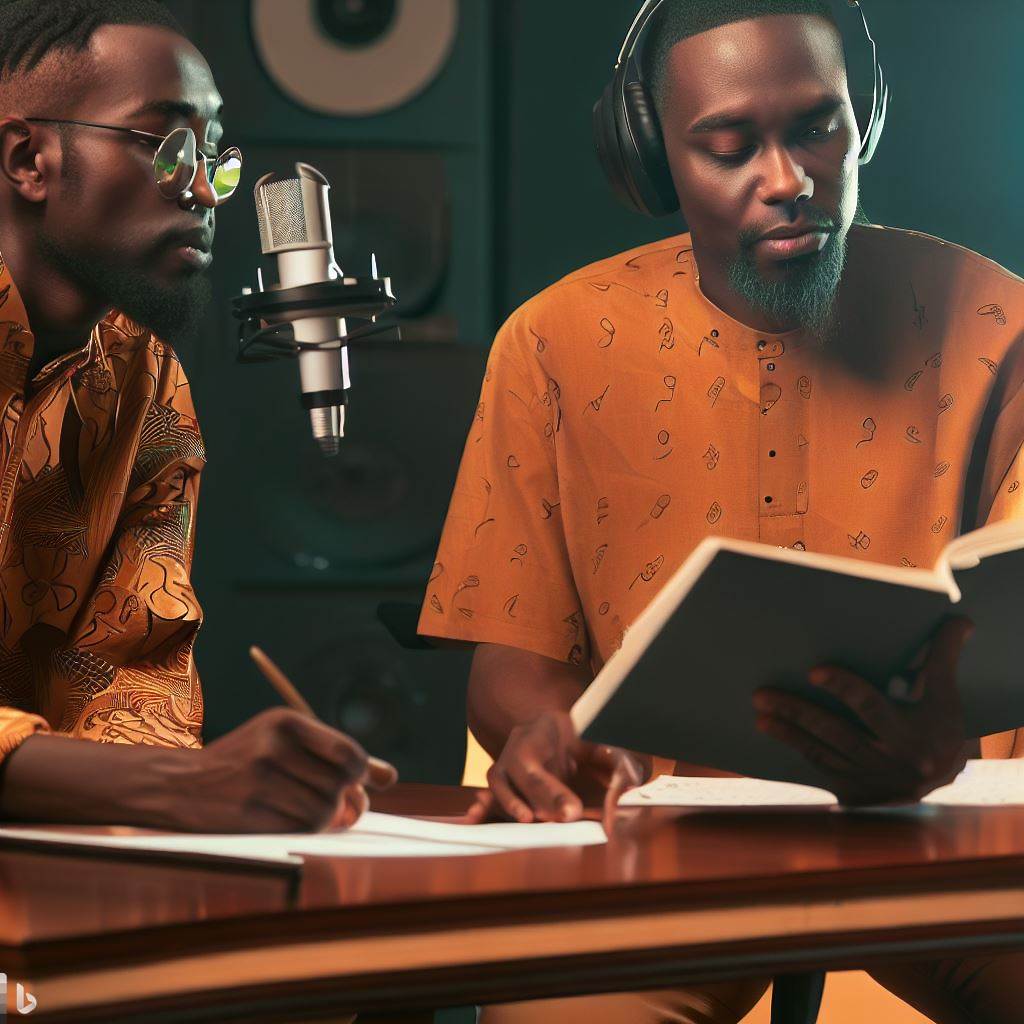Introduction
Brief background on the importance of music publishing contracts
Music publishing contracts play a crucial role in the music industry by ensuring that songwriters, composers, and music producers receive fair compensation for their work.
These contracts define the rights and obligations of the parties involved, including the use, distribution, and licensing of musical compositions.
Overview of the music industry in Nigeria
The Nigerian music industry is a thriving and vibrant market with a rich cultural heritage. It is known for its diversity and contributions to various genres, including Afrobeat, Afropop, and Highlife.
Nigerian musicians have gained global recognition, leading to collaborations with international artists and the emergence of successful music labels within the country.
Thesis statement
This blog post aims to provide a comprehensive understanding of music publishing contracts in Nigeria.
Music publishing contracts are vital for Nigerian artists to protect their intellectual property rights, receive fair royalties, and navigate the complex legal landscape.
This post will delve into the key components of these contracts, including copyright ownership, royalty rates, and the role of music publishers in Nigeria.
Additionally, it will address challenges faced by artists in negotiating favorable publishing agreements, explore case studies, and provide practical tips for aspiring musicians.
By examining the significance of music publishing contracts and understanding their impact on the Nigerian music industry, artists and stakeholders can make informed decisions that safeguard their rights, maximize their earnings, and contribute to the growth and sustainability of the industry.
Understanding Music Publishing Contracts
Definition and purpose of music publishing contracts
A music publishing contract is a legally binding agreement between a songwriter or composer and a music publisher.
Its purpose is to outline the rights and obligations of each party regarding the commercial exploitation of the songwriter’s work.
Key elements and clauses typically included in these contracts
A music publishing contract is a legally binding agreement between a songwriter and a publisher, outlining their rights and obligations regarding song commercialization.
The primary purpose of such contracts is to establish the terms and conditions under which the publisher can exploit the songwriter’s compositions for financial gain.
- Exclusive rights: One of the fundamental aspects of a music publishing contract is the granting of exclusive rights to the publisher.
This means that the publisher has the sole authority to exploit the songwriter’s compositions for commercial purposes. - Royalty rates and distribution: The contract defines the royalty rates, which is the percentage of revenue the songwriter will receive from the exploitation of their compositions.
It also specifies the distribution mechanism, ensuring that the songwriter’s royalties are collected and paid correctly. - Song ownership and copyright: In a music publishing contract, it is crucial to establish who owns the rights to the songs.
Typically, the songwriter retains the copyright while granting the publisher a license to exploit the compositions for a specific duration. - Song registration and administration: The contract includes provisions for registering the songs with relevant royalty collection agencies and administering their commercial use.
This ensures that the songwriter receives proper credit and payment for their work. - Termination and reversion clauses: These clauses define the conditions under which either party can terminate the contract.
They also outline how the rights to the songs revert back to the songwriter if the agreement is terminated.
By including these key elements and clauses in a music publishing contract, both the songwriter and the publisher can protect their interests and ensure a fair and transparent relationship.
Read: Guide to Becoming a Successful Scriptwriter in Nigeria
Importance of Music Publishing Contracts in Nigeria
Music publishing contracts play a crucial role in the Nigerian music industry, providing various benefits and opportunities for artists.
These contracts are essential for protecting artists’ intellectual property rights, generating revenue, and expanding opportunities in the global music market.
Protection of artists’ intellectual property rights
One of the primary reasons why music publishing contracts are crucial in Nigeria is the protection of artists’ intellectual property rights.
These contracts outline the ownership and usage rights of musical compositions, lyrics, and recordings.
By entering into a music publishing contract, artists ensure that their work is safeguarded from unauthorized use, reproduction, or distribution.
This protection not only preserves the artists’ creative integrity but also prevents others from profiting off their work without proper authorization.
Revenue generation and royalty collection
Music publishing contracts in Nigeria also facilitate revenue generation and royalty collection for artists.
These contracts provide mechanisms for the monetization of their music through licensing, distribution, and synchronization deals.
Through licensing agreements, artists grant permission for their music to be used in various media such as films, advertisements, and television shows.
In return, they receive royalties, which are typically a percentage of the revenue earned from these uses.
Furthermore, music publishing contracts enable artists to collect royalties from public performances, both domestically and internationally.
These contracts establish a framework for the collection and distribution of these performance royalties, ensuring that artists receive their fair share of earnings.
Expanding opportunities for Nigerian musicians in the global market
Music publishing contracts also play a vital role in expanding opportunities for Nigerian musicians in the global music market.
These contracts enable artists to reach a broader audience and tap into international markets.
By signing publishing deals with international companies or establishing their own publishing entities, Nigerian artists can benefit from the expertise, networks, and resources of established players in the global music industry.
This collaboration opens doors to international collaborations, distribution deals, and exposure on a global scale.
Furthermore, music publishing contracts provide Nigerian musicians with access to international copyright protection systems.
This protection ensures that their music is safeguarded not only in Nigeria but also in other countries, allowing them to reap the rewards of their creativity beyond national borders.
Music publishing contracts in Nigeria are of utmost importance for artists.
These contracts protect their intellectual property rights, generate revenue through licensing and royalties, and expand their opportunities in the global music market.
By understanding the significance of these contracts and entering into favorable agreements, Nigerian musicians can thrive and succeed in the dynamic and competitive music industry.
Read: Music Publisher: The Unsung Hero of Nigeria’s Music
Challenges in Music Publishing Contracts in Nigeria
Lack of awareness and understanding among artists
- Many artists in Nigeria are not aware of the importance of music publishing contracts.
- Artists often lack a proper understanding of the terms and conditions included in these contracts.
- Due to this lack of awareness and understanding, artists may not fully protect their rights and interests.
- Without proper knowledge, artists may unknowingly sign unfair contracts that could result in financial loss.
- Educating artists about music publishing contracts is crucial to ensure they make informed decisions.
Predatory practices by some industry professionals
- Unfortunately, some industry professionals take advantage of artists’ lack of knowledge and exploit them.
- These individuals may include unfair clauses in contracts that benefit themselves more than the artists.
- Artists may be forced into signing contracts with unfavorable terms due to limited alternatives.
- Such predatory practices restrict artists from receiving their fair share of royalties and revenue.
- Stricter regulations are needed to protect artists from these exploitative practices.
Limited legal framework and enforcement
- Nigeria has a limited legal framework specifically addressing music publishing contracts.
- This creates a loophole that allows for potential exploitation and unfair treatment of artists.
- Even when contracts are in place, the enforcement of these agreements may be challenging.
- The lack of effective enforcement mechanisms leaves artists vulnerable and unable to seek justice.
- A comprehensive legal framework and stronger enforcement mechanisms are necessary to protect artists’ rights.
In the end, the challenges faced in music publishing contracts in Nigeria are significant and require urgent attention.
The lack of awareness and understanding among artists, along with predatory practices by industry professionals, pose a threat to artists’ rights and potential earnings.
Additionally, the limited legal framework and enforcement further undermine the protection of artists’ interests.
To address these challenges, it is crucial to educate artists about the importance of music publishing contracts and provide them with the necessary knowledge to make informed decisions.
Stricter regulations and enforcement mechanisms should also be implemented to prevent predatory practices and ensure fair treatment of artists.
By addressing these issues, Nigeria can create a more equitable and transparent music industry for all artists involved.
Read: Collaboration in Music: The Publisher’s Role in Nigeria

Legal Framework of Music Publishing Contracts in Nigeria
Copyright Act and relevant provisions
Nigeria’s Copyright Act provides the legal foundation for music publishing contracts in the country. It outlines the rights and obligations of both music publishers and artists.
One key provision is that the Act grants exclusive rights to copyright owners, including the right to reproduce, distribute, and publicly perform their works.
This gives music publishers the authority to control how their works are used and to enter into contractual agreements.
Additionally, the Act defines the rights of authors, performers, and producers, ensuring that they are adequately protected.
This allows music publishers to negotiate fair terms and compensation for the use of their copyrighted works.
Collective management organizations (CMOs) and their role in royalty collection
In Nigeria, Collective Management Organizations (CMOs) play a vital role in the collection of royalties on behalf of music publishers and artists.
CMOs, such as the Copyright Society of Nigeria (COSON) and the Musical Copyright Society of Nigeria (MCSN), are responsible for licensing the use of copyrighted musical works and collecting royalties from various users, including broadcasters, event organizers, and digital platforms.
These organizations have established licensing agreements with different sectors that use music commercially.
They ensure that the appropriate royalties are paid to music publishers and artists based on the usage of their works. CMOs play a crucial role in monitoring and enforcing these licensing agreements.
Recent legislative developments and their impact on music publishing contracts
In recent years, Nigeria has seen significant legislative developments that have impacted music publishing contracts.
One notable development is the passage of the Nigerian Copyright Act of 1988 (Amendment) Bill.
This amendment introduced provisions that better protect the rights of music publishers and artists, including stronger enforcement mechanisms and increased penalties for copyright infringement.
Furthermore, the emergence of digital music platforms and streaming services has led to changes in the music industry.
Technological progress enables publishers/artists to monetize but poses challenges like piracy and unauthorized copyrighted content use.
To address these challenges, the Nigerian Copyright Commission (NCC) has been actively working to enforce copyright laws and combat piracy.
They have partnered with industry stakeholders, including CMOs, to enhance the protection of music publishers’ rights and ensure fair compensation for their works.
In fact, the legal framework surrounding music publishing contracts in Nigeria is built on the Copyright Act and its relevant provisions.
CMOs play a crucial role in collecting royalties, and recent legislative developments have strengthened the protection of music publishers’ rights in the digital era.
These developments provide a more robust foundation for music publishing contracts and encourage the growth of the music industry in Nigeria.
Read: Insider’s Guide to Music Licensing in Nigeria
Negotiating and Drafting Music Publishing Contracts in Nigeria
Steps to consider before signing a contract
- Thoroughly research and understand the terms offered in the music publishing contract.
- Assess the reputation and track record of the publishing company.
- Consult with a qualified entertainment lawyer to ensure legal protection and understanding.
- Consider the duration and exclusivity of the contract, as well as the royalty rates and advances offered.
- Review the territory rights granted in the contract, ensuring they align with your goals.
- Negotiate for favorable terms that protect your creative rights and financial interests.
- Seek advice from experienced musicians or industry professionals who have previously dealt with similar contracts.
- Ensure transparency regarding accounting and royalty statements, clarifying how earnings will be tracked and disbursed.
- Assess the termination clauses carefully, understanding the repercussions and options for termination.
Important clauses to include for artist protection
- Ownership of intellectual property rights: Clearly state that the artist retains ownership of their musical compositions.
- Royalty rates and payment terms: Clearly outline the percentage and frequency of royalty payments.
- Advance payments: Specify the amount and conditions for any advance payments made to the artist.
- Accounting and auditing rights: Include provisions to allow the artist to audit the publisher’s accounting records.
- Grant of rights: Specify the specific rights granted to the publisher, including territorial limitations.
- Synchronization rights: Address the use of the artist’s music in films, commercials, or other media.
- Moral rights protection: Safeguard the artist’s right to be identified as the creator of their work.
- Term and termination: Clearly define the contract duration and the conditions for termination.
- Dispute resolution: Include provisions for resolving any conflicts or disagreements that may arise.
Working with legal professionals in contract negotiation and review
Navigating the complexities of music publishing contracts in Nigeria requires the expertise of legal professionals. Here’s how they can help:
- Understanding the contract terms: Lawyers can provide explanations and interpretations of the complex language used in contracts.
- Negotiating favorable terms: Legal professionals can negotiate on your behalf to secure better royalties, advances, and rights.
- Ensuring legal protection: Lawyers can draft contracts that protect your interests and rights as an artist.
- Reviewing and amending contracts: Professionals can carefully assess the terms and suggest amendments to ensure fairness.
- Providing industry knowledge: Lawyers experienced in the music industry can offer insights and guidance based on their expertise.
- Assisting with dispute resolution: If conflicts arise, legal professionals can help resolve disputes through negotiation or legal action.
In essence, negotiating and drafting music publishing contracts in Nigeria requires careful consideration, legal guidance, and a thorough understanding of the terms involved.
By taking recommended actions, artists secure rights, consult legal experts, and include vital clauses for equitable agreements.
Case Studies of Successful Music Publishing Contracts in Nigeria
Well-known music publishing deals in the Nigerian music industry
- EMI Music Publishing Nigeria: In 2012, EMI signed a licensing and publishing deal with popular Nigerian artist, Wizkid.
- Sony/ATV Music Publishing Nigeria: This company has successfully secured publishing rights for multiple Nigerian artists, including Davido and Tiwa Savage.
- Universal Music Publishing Group: In 2020, Universal signed a publishing deal with Burna Boy, one of Nigeria’s biggest music exports.
- Chocolate City Music Publishing: This Nigerian music company has been instrumental in securing publishing deals for artists such as M.I Abaga and Ice Prince.
Lessons learned and insights gained from these success stories
- Importance of proper legal representation: These successful deals were made possible by having competent legal advisors who negotiated favorable terms.
- Building solid relationships: Artists who had established strong relationships with music publishing companies were able to secure better deals.
- Understanding the value of their work: Successful artists recognized the worth of their music and demanded fair compensation for their intellectual property.
- Expanding international reach: Many of these successful contracts involved collaborations with international music publishing companies, allowing Nigerian artists to reach a global audience.
- Negotiating favorable terms: Artists and their legal representatives ensured that the contracts included provisions for royalties, rights ownership, and creative control.
- Adapting to the digital era: Successful contracts acknowledged the importance of digital distribution and included clauses related to streaming and online platforms.
- Protecting intellectual property: These artists prioritized registering their music and copyrights to safeguard their work from piracy and unauthorized use.
- Diversifying revenue streams: The successful contracts included provisions for licensing, synchronization, and performance royalties, enabling artists to earn income from various sources.
- Constantly evolving contracts: As the music industry changes, successful publishing contracts are flexible and allow for renegotiations to adapt to new technologies and business models.
- Investing in talent development: Music publishing companies that support and invest in the growth of their artists tend to have more successful contracts and long-lasting partnerships.
By analyzing these case studies, it is evident that successful music publishing contracts in Nigeria require a combination of talent, strategic partnerships, legal expertise, and a deep understanding of the music industry.
Artists and their representatives must be proactive in securing fair deals and protecting their intellectual property rights to thrive in the ever-evolving music landscape.
Gain More Insights: How to Become a Successful Artists’ Agent in Nigeria
Conclusion
Importance & Complexities
Music publishing contracts in Nigeria hold immense significance, shaping artist earnings and rights intricately.
These agreements navigate copyright ownership, royalty distribution, and usage permissions, demanding careful attention.
Legal Guidance for Protection
Artists must prioritize legal counsel to safeguard their interests. Competent advice ensures fair terms, prevents exploitation, and upholds creative control.
Secure contracts empower artists to receive rightful dues and maintain control over their creations.
Future of Music Publishing
The future of music publishing in Nigeria appears promising yet challenging. Evolving digital landscapes necessitate adaptable contracts.
Collaboration between artists, lawyers, and industry stakeholders will define a balanced and equitable music ecosystem.
In this dynamic landscape, understanding and addressing the nuances of music publishing contracts are paramount.
By seeking expert legal advice, artists can fortify their careers and contribute to a thriving Nigerian music industry.




